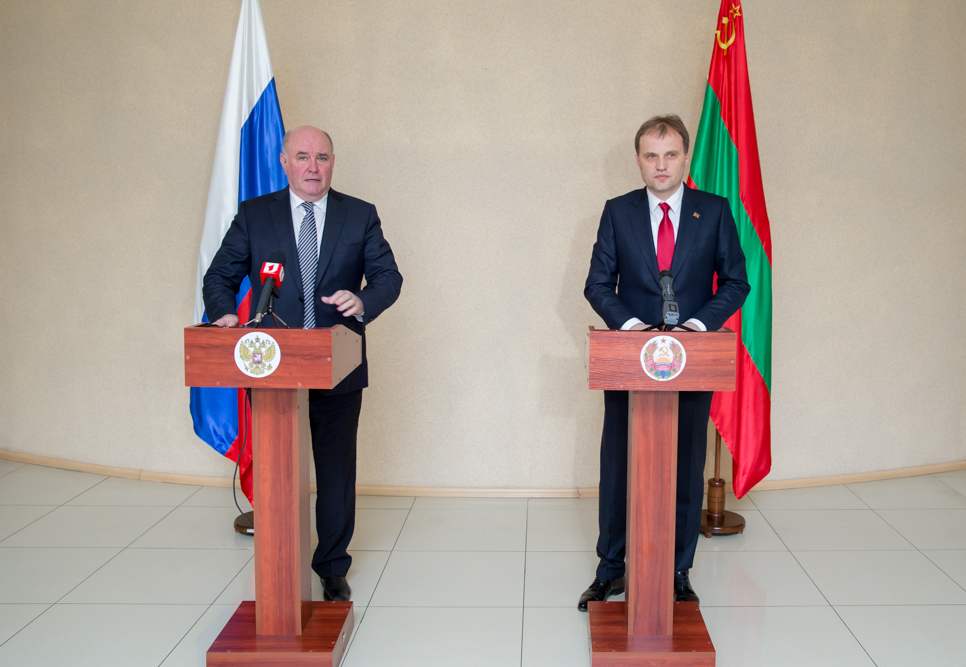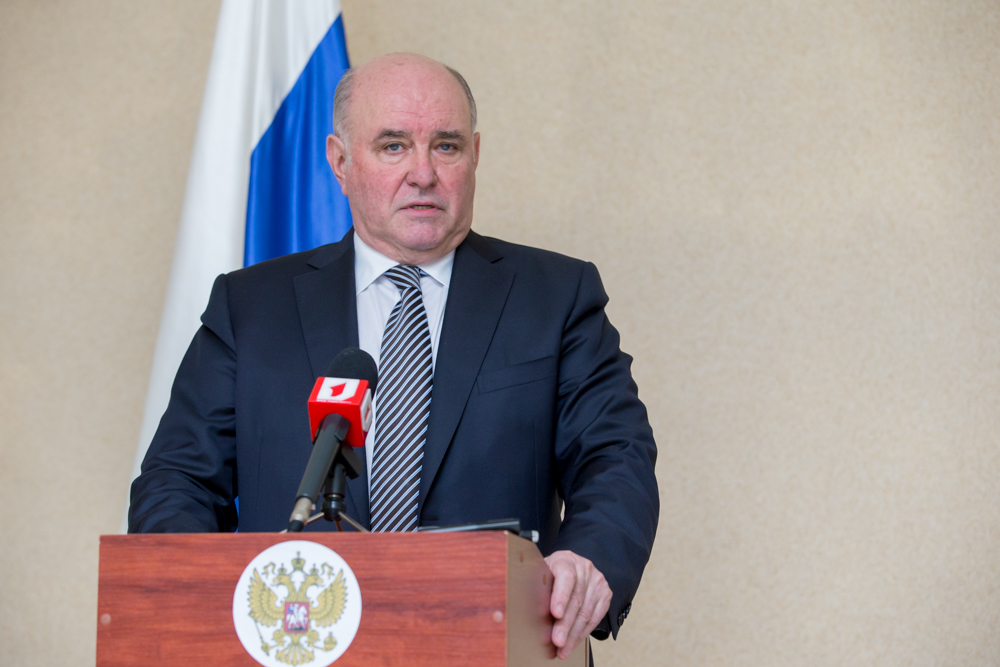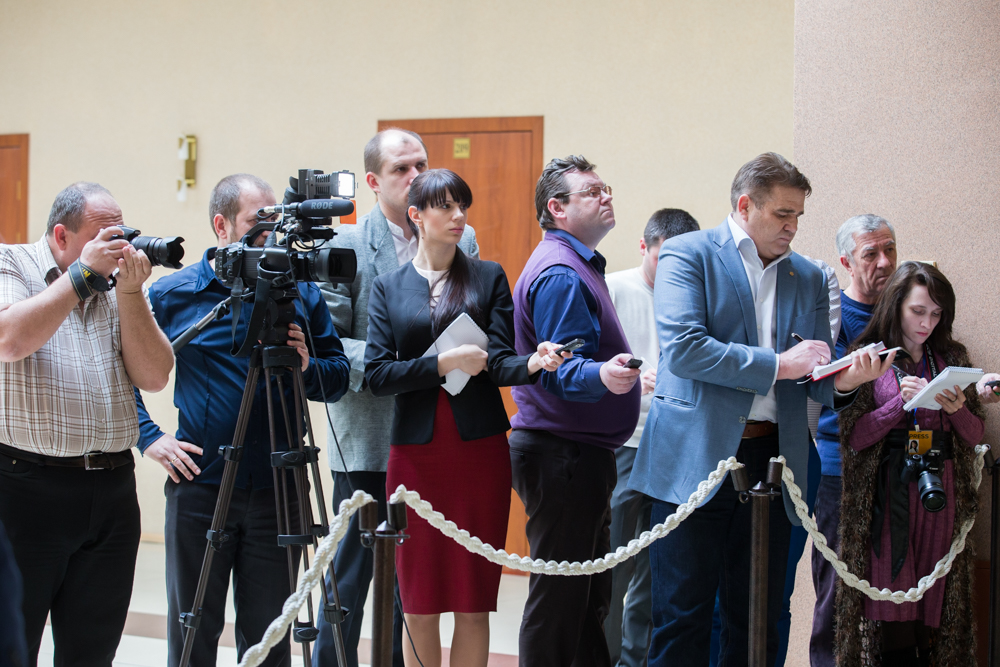The President of Pridnestrovie and the State Secretary - Deputy Minister of Foreign Affairs of the Russian Federation commented on the results of the meeting held today on March 29 in Tiraspol. Yevgeny Shevchuk and Grigory Karasin answered journalists' questions.
President of Pridnestrovie Yevgeny Shevchuk: In the course of the meeting we have discussed the situation around the negotiation process, the problems that hinder constructive dynamics of the negotiations. We have discussed and touched on the implementation of the Russian Federation’s humanitarian projects in Pridnestrovie. Pridnestrovie appreciates positively all of these projects in general, because they are aimed primarily at people, at the formation of living conditions for Russian citizens and compatriots living here - in Pridnestrovie.
All Pridnestrovians highly appreciate the humanitarian projects on education, health care, humanitarian support of our senior persons. All this has been done by the Russian Federation in difficult times. I have expressed the gratitude on behalf of Pridnestrovian citizens to the Russian Federation’s leadership, the Special Representative of the Russian President for Pridnestrovie, the leadership of the Ministry of Foreign Affairs and all the officials who helped ensure that these projects to be implemented in Pridnestrovie. Pridnestrovian citizens, Russian citizens needed very much that these projects, primarily in the areas of health and education, to be realized.
We have also touched upon the negotiation process issues.
State Secretary - Deputy Minister of Foreign Affairs of Russia Grigory Karasin: I am grateful to Yevgeny Shevchuk for the opportunity to meet, understanding how busy the schedule of the Pridnestrovian president is, knowing about the serious problems that must be solved daily.
Many thanks for a quite detailed analysis of our joint economic and humanitarian projects. Thank you for the high appreciation you have given to our peacekeepers, serving in Pridnestrovie and being an assuarance that stability and peaceful life of people living in the country will be reliably guaranteed.
We have touched upon the Pridnestrovian settlement negotiation process. We understand all existing problems. Unfortunately, they are not solved, but accumulated for the most part. This is also exacerbated by the pre-election period in Moldova and certain political instability that is inherent in domestic policy of the country. I assume that this will lead to increased emotionality in approaches. And this is that on which we have concentrated in order to direct the negotiation process towards a constructive track, to ensure that internationally recognized formats and especially the 5+2 format to work in a climate of mutual respect for all participants and to lead to concrete results. It is not so easy to do. Because, as I said, much negativity has accumulated, there is a lack of trust. But both here, and in Kishinev, talking to Moldova’s leadership, we insisted on the need to somewhat slow down the emotional notch now and to start thinking about establishing a direct and constructive dialogue with the leadership of Pridnestrovie, to discuss specific issues rather than to exchange information through the media, to voice some propaganda slogans, but to forge working climate. I hope that today's discussion was really mutually useful. We take the impression of constructivism with us, the readiness for real deeds, for the goodwill with regard to the Pridnestrovian conflict settlement. Therefore, we will work, coordinating efforts together. I hope that we will have a specific result in the near future. Thank you.
TASS News Agency: Grigory Borisovich, you have met with the new leadership of Moldova today. What are your impressions? Have you discussed with them a sensitive issue related to our Russian citizens, who are often detained at the airport? I mean journalists, political scientists, our colleagues.
Grigory Karasin: Thank you for the question. It is absolutely pertinent. Indeed, there has been a government in Moldova perhaps for the first time in more than two years. We met with the Prime Minister and discussed all issues of bilateral relations with our country, which are difficult to advance without addressing the acute problems existing in our relations. Naturally, this concerns sensitive issues. The general impression is that Moldavia’s leadership is trying to stabilize the situation now, trying to grope for the algorithm, which will help to make the situation more predictable, to approach presidential elections that will be held sometime in autumn this year. But I want to stress once again that we warned about that: the election situation may bring all international efforts on Pridnestrovian settlement to a deadlock again, belligerent theses of some so-called sharp politicians may prevail. We are not interested in that. Russia is interested in relations with Moldova to be constructive, rhythmic, developed in those areas where it is really necessary for both countries. We expressed hope that we would achieve positive developments in the Pridnestrovian settlement. Thank you!
Novosti Pridnestrovya News Agency: The issue on the current lack of activity of the negotiation process between Moldova and Pridnestrovie has already been touched on today, it is almost stagnating. Kishinev constantly avoids talking substantively with Tiraspol. What are the prospects to reverse the situation, to get the negotiations with Kishinev back on a constructive substantive track? What should Pridnestrovie and Russia do to induce Moldova to behave more constructively?
Yevgeny Shevchuk: Pridnestrovie has always proceeded from the neighbourhood policy. We have always stood for solving problems at the negotiating table. The efforts of our Foreign Ministry were aimed at it. We note that recently - a year and a half or two - the atmosphere in the 5+2 format, in the negotiation format, in various formats of interaction, in our opinion, is somewhat undermined by unilateral actions, such as the initiation of a whole group of criminal cases against PMR officials, particularly of law enforcement and judicial authorities, the Government. Moreover, these acts were committed unilaterally. In our opinion, it constrains the freedom of movement of these officials and exacerbates the atmosphere in any format for negotiations.
Second. The problem with the movement of Russian peacekeepers through the Kishinev airport is evident. This is a very sensitive issue for us considering the fact that we observe certain intensification of cooperation between the NATO structures and the RM power structures on the territory of Moldova recently. This creates certain risks and tension for us. The next area that is sensitive for us is the RM’s attempts, in our view, to block our economic activity by taking a decision unilaterally on the placement of Moldovan structures on the Pridnestrovian-Ukrainian border from the direction of Ukraine. We consider these possible unilateral actions as the completion of a full cycle of the blockade of Pridnestrovie’s foreign economic activity. We believe that this is contrary to the fundamental approaches in the negotiation process, which are as follows: one of the principal conditions to develop confidence-building measures is non-committing the acts which may aggravate the situation of the opposite party. In our opinion, such actions were enough.
We aim to solve problems of citizens, of the economy. We aim to solve a whole group of problems in the field of movement of people and goods whithin the concept of realization of the “small steps” tactics which was previously agreed by the parties and which is designed to facilitate the whole group of systemic contradictions. We hope that with the political will of our colleagues in Kishinev, we will be able to move forward in dealing with the problems that concern sensitive areas on the movement of citizens, goods and so on. We aim for cooperation. I think that the economic crisis, existing in the region and in the CIS countries, should, on the contrary, encourage the cooperation so that in this difficult time we will not create additional problems in the economy. I think it is in the interests of Pridnestrovie and Moldova. I hope that the new Moldovan representative in the negotiation process, the RM’s political leadership will give the relevant impetus to their negotiators. Pridnestrovie is ready to discuss, and the main point is that it is ready to resolve the whole group of accumulated problems in the name of economy, first of all our citizens, we are ready to consider the interests of our partners in a mutually beneficial basis.
Grigory Karasin: There is little left for me to add to what Yevgeny Vasilyevish has said. I believe that it is absolutely reasonable systems position. I will add only one thing. The success in the negotiations, the success in the contacts on the Pridnestrovian settlement depends on the willingness of both sides to establish equal and mutually respectful contact with each other on a personal level, through negotiations of delegations, and not through statements on TV, without megaphone forms of announcing decisions. Any decisions on such a sensitive matters as relations between Tiraspol and Kishinev, in general as for the state of affairs Pridnestrovie needs certain discretion, respect for each other's positions, no attempts to pressure. I hope that this mood will be decisive in the approaches of Kishinev and Tiraspol.
Pervy Pridnestrovsky TV Channel: Yevgeny Vasilyevich has mentioned the “small steps” tactics. Experts criticize it now. We know that it is supported by all participants of the negotiation process, but at the same time experts call on to react to Kishinev’s unilateral actions not by political and diplomatic methods, but by decisive actions. In your view - the view of an experienced diplomat, has the tactics of “small steps” exhausted itself? Whether you should use some arguments that rely on force in the dialogue with Kishinev?
Grigory Karasin: I believe that perhaps the phrase “small steps” is not very successful, because some “small steps” are quite weighty and significant by value. I would say that the tactics of the movement forward has not exhausted itself, the international community, including the Russian Federation, is ready to assist in ensuring these contacts to be productive. Thus, we have to work. And this is the work of politicians, diplomats, and just thinking people who are interested in the fact that the situation will be no more at an impasse, but, unfortunately, it has frozen for the last two and a half years, it is necessary to bring it out of this “freeze state”.
Source: the website of the PMR President










